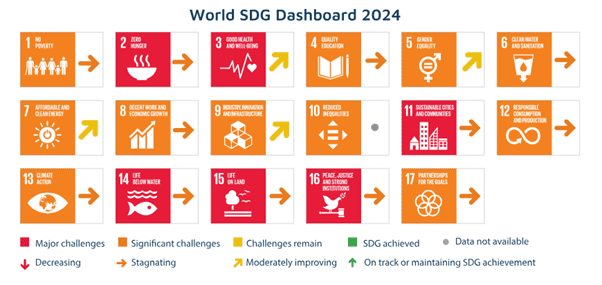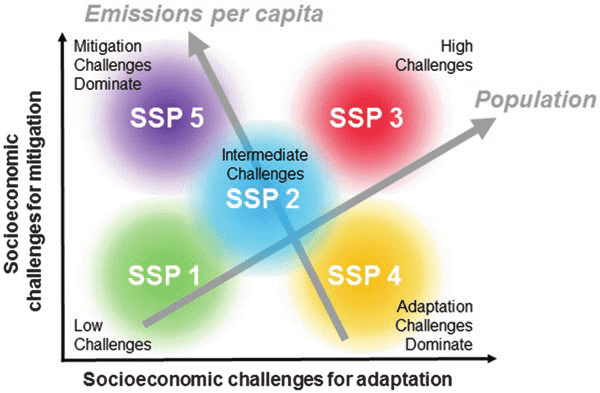We approach the climate crisis as though limiting global warming to1.5oC is a faith-based challenge. If we have the right beliefs, salvation awaits. In the meantime, actions are a matter of our discretion.
Hence, we emphasise climate leadership training. For example, as part of Ireland’s Public Sector Climate Action Mandate 2023, the government requires that public sector bodies:
“Ensure all senior management (P.O. level or equivalent and above) complete a climate action leadership training course in 2023”
The assumption is that if leaders understood and believed the problem, their strategies would align. However, most psychologists say that individual consciously held beliefs are mainly irrelevant to group behaviour (Ted Delay, Future of Denial. 2024).
Strategy is about the future. Of course, the future is essentially unknowable and unpredictable, which is what makes it influenceable. Not knowing is a resource for change. This is very uncomfortable for leaders addicted to master plans. The poet John Keats praised the capacity to leverage not knowing as a “negative capability”.
Likewise, futurists criticise our efforts to shape the future. For example, Riel Miller (Tech 4 Future podcast, 2024) states that transformative system change cannot be known in advance and cannot happen by design. This implies a criticism of many of our present-day governance efforts to shape the future—such as the Sustainable Development Goals, which seek to project yesterday’s thinking onto the future. Could this be the past colonising the future?
The difficulty with this is that if we believe we can use thinking from the past to determine the future, then we don’t actually have to be present as the future unfolds. And the future is unpredictable, filled with events that no one expected. As the boxer Mike Tyson observed “everyone has a plan until they get punched in the mouth”. Or President Eisenhower, in a similar vein – “plans are worthless, but planning is everything”.
This may offer a way of thinking about the SDGs being way off track, with only 16% of the targets on track, as per the Sustainable Development Report published in June 2024.

SDGs – Global implementation progress (June 2024)
Our governance systems are too rigid and stuck, and we are stuck with them. In trying to keep everything predictable and safe, we risk catastrophe.
The outcome of current governance is that climate leadership is about incrementalism, i.e., improving performance within the existing rules and norms of the system and, by implication, preserving prevailing power and interest relationships. There is logic to this—as the feminist author Audre Lorde observed, “The master’s tools will never dismantle the master’s house.”
The SSPs (shared socio-economic pathways)
The IPCC uses five scenarios (SSPs) to help us build a picture of the future. If we treat any of them as prophecies, we blinker ourselves. They are possible futures based on the extent to which GHG emissions are mitigated and the extent to which we adapt to climate change. It is worth noting that SSPs are firmly grounded in an ideology of capitalism and competitive markets. In other words, they are designed to preserve the master’s house. They provide a lens for how capitalism and markets might serve the greater good.

A-conceptual-map-of-the-five-families-of-IPCC-Shared-Socioeconomic-Pathways-SSPs Source – Jane O’Sullivan The University of Queensland | UQ · School of Agriculture and Food Sciences.
- SSP1 is the guilded future (albeit worse than today) keeps us below 1.5o It is based on high mitigation and low socio-political resistance to adaptation. In other words, it paints a world of global social democracy, frictionless cohesion and large-scale atmospheric carbon capture.
- SSP2 is positioned as “business as usual” with intermediate efforts around mitigation and adaptation and a patchwork quilt approach, with some countries making more progress than others.
- SSP3 is a world or regional rivalry in which countries lose trust in global institutions, seek national energy and food security, and ignore environmental concerns. This world has hard borders, competitive markets, and ruthless capitalism.
- SSP4 is a world of inequality where mitigation is high, and adaptation is low. A small number of high-tech sectors dominate, while most of the world’s poor live in subsistence (or squalor). It sends a message that the SSPs worst from a human welfare perspective are not the worst for temperature.
- SSP5 represents continued fossil fuel-based development. It is a high-growth world; the economy continues to boom, there is lots of investment in social infrastructure, and we control (or attempt to) the climate catastrophe through global geoengineering solutions. It contains all the contradictions inherent in liberal economics.
Let’s look at the temperatures for each scenario selected:
| Scenario descriptor | 2021 – 2040 Range + oC | 2041 – 2060 Range + oC | 2081 – 2100 Range + oC |
| SSP1 (1.9) | 1.2 to 1.7 | 1.2 to 2.0 | 1.0 to 1.8 |
| SSP2 (4.5) | 1.2 to 1.8 | 1.6 to 2.5 | 2.1 to 3.5 |
| SSP3 (7.0) | 1.2 to 1.8 | 1.7 to 2.6 | 2.8 to 4.6 |
| SSP4 (6.0) | 1.2 to 1.8 | 1.5 to 2.0 | 2.2 to 3.8 |
| SSP5 (8.5) | 1.3 to 1.9 | 1.9 to 3.0 | 3.3 to 5.7 |
Source: IPCC Sixth Assessment Report (2021)
One difficulty with the SSPs is that they include a scenario where warming is limited to 1.5oC. This presents a difficulty because our governance system treats the 1.5oC as a belief and has built its master plans as if it is an article of faith. To keep us faithful, leaders such as UN Secretary-General Antonio Guterres (whom I admire) warn us of the hell that awaits us if we deviate from the path.
The difficulty is that we are not on the 1.5oC path, and no amount of chest-thumping, pleading, or engineering is likely to get us there. Capitalist ideology is too strong, and faith in markets is too intense. All incentives are to “keep burning.”
At the moment, if countries implement the commitments they have made through the COP process, we are on a path that straddles SSP2 and SSP3. If right-wing sentiment on immigration, nationalism and borders holds away, we can expect SSP4 to form elements of our future. And if it is true that humans are not in control –and we really are fully enslaved by capitalist ideology – then SSP5 comes into play.
So what do we do?
I think we need to be much more honest, humble, experimental and attuned to reality. From local to global our governance systems need a radical overhaul – to become more real-time, more responsive and more caring of who we really are. It is beyond my humble imagination to picture it but it feels radical. I believe we urgently need to lean into it. Just take the first step and let the work teach us…
Climate Leadership was never more needed! And it is not something we can be trained in…
Share this on...